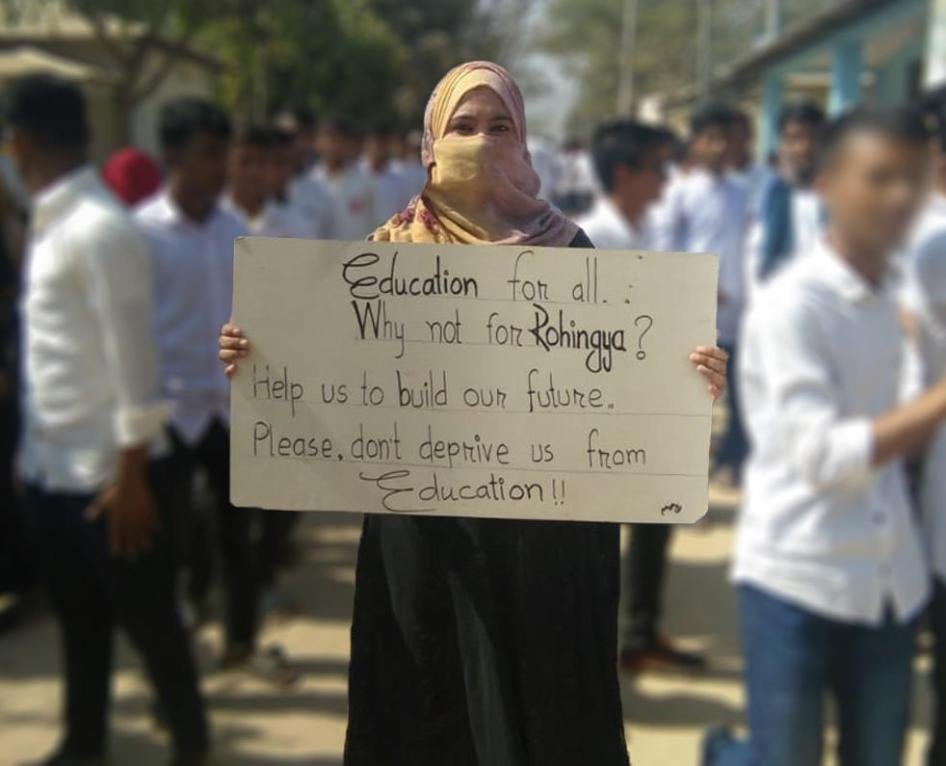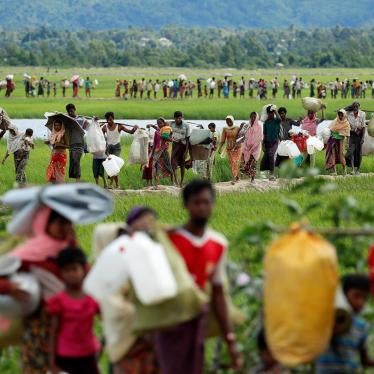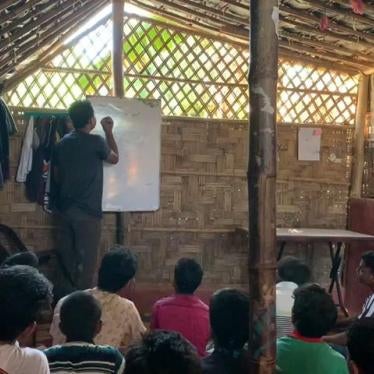(New York) – Governments participating in the October 22, 2020 fundraising conference for the Rohingya humanitarian crisis should insist that Myanmar and Bangladesh ensure Rohingya children’s right to education, Human Rights Watch said today in a letter to the conference hosts. The majority of Rohingya children both in Myanmar’s Rakhine State and in refugee camps in Bangladesh are barred from formal education.
“This entire generation of Rohingya children is being deprived of education and there is no end in sight to the status quo of gross discrimination in both Myanmar and Bangladesh,” said Bill Van Esveld, associate children’s rights director at Human Rights Watch. “Donor governments should demand a paradigm shift to fulfill this basic human right of quality education, with the full involvement of the Rohingya community.”
The US, UK, EU, and the UN refugee agency are hosting the donors’ conference with the aim of closing the $500 million funding gap in a humanitarian needs plan budgeted at $1 billion. Most of those resources will be committed to support the Rohingya in Bangladesh.
Education programs have been further restricted or shut down entirely in Rohingya detention camps in Myanmar and in Rohingya refugee camps in Bangladesh due to Covid-19 related closures, with limited distance learning alternatives. But even if existing programs were fully funded and reopened, the vast majority of Rohingya children would still be denied access to formal, accredited education or secondary school, Human Rights Watch said.
Donor governments should demand the Myanmar authorities lift barriers to Rohingya children’s access to education inside the camps and villages in Rakhine State, and press Myanmar to accredit formal education in the Myanmar curriculum for refugee children in Bangladesh.
Donor governments should insist that Bangladesh urgently lift restrictions on Rohingya refugee children’s ability to enroll in formal, accredited education, and to complete secondary education. Bangladesh does not allow Rohingya children to study the Bangladesh curriculum but has greenlit a “pilot” project to teach the Myanmar curriculum. Bangladesh and humanitarian groups working with Rohingya refugees should urgently develop plans to scale up the Myanmar curriculum to all children, and implement the core humanitarian principle that refugee communities play a leading role in education programming.
Myanmar
In Myanmar, about 600,000 Rohingya remain in Rakhine State, confined by the Myanmar government in camps and villages under conditions that amount to the crimes against humanity of apartheid, persecution, and severe deprivation of liberty.
About 65,000 Rohingya children are detained in camps, where they are mainly provided, at best, with only basic instruction in “temporary learning centers.” Access to secondary education is limited to a single government school with 600 students, only two teachers, and four volunteer instructors. Rohingya students were expelled and barred from the last accessible university, in Sittwe, in 2012.
“In Myanmar’s Rakhine state, children and their parents are effectively locked down in villages and detention camps to which humanitarian access is severely restricted, and for most children, access to education is an unfulfilled dream,” Van Esveld said. “The international community should pressure the Myanmar government to give these Rohingya children a real future, not indefinite confinement.”
Bangladesh
In Bangladesh, none of the nearly 400,000 school-age Rohingya refugee children currently have access to certified, formal primary or secondary education, or to university or college. Bangladesh government policy also bars formal education, including in refugee camps and at public and private schools, to Rohingya refugees who entered in the 1990s or before, and to their children born in Bangladesh.
Since mid-2019, Bangladesh authorities have allowed humanitarian groups to provide younger children with a “learning competency framework approach,” but this is not formal or accredited and includes only a few years of lessons.
In January, Bangladesh approved a “pilot” program to allow 10,000 children to study the formal Myanmar curriculum, with the assumption that they would eventually return to Myanmar. This is a potentially significant positive first step, but there is no public information as to whether Myanmar will accredit this education or Bangladesh will certify the students’ progress, or when the program will be scaled up to reach the other 390,000 Rohingya children.
On August 24, Foreign Secretary Masud Bin Momen announced that Bangladesh will “ensure access [to education for] Rohingya children according to [the] Myanmar curriculum” and that a “Myanmar Curriculum Pilot” had been adopted under the Joint Response Plan. Donors should ensure that their education aid supports access for all Rohingya refugee children to formal education.
There are virtually no training or vocational programs available in Bangladesh for Rohingya youth who have aged out of available education programs. Bangladesh authorities are building barbed-wire fencing around the refugee camps, citing concerns about the potential deterioration of the security situation, but for Rohingya youth who fall into the age range most at risk of criminal exploitation, the authorities have essentially blocked any education that would provide them with the skills to contribute to their community.
“Affording Rohingya refugee children the right to education will be critical to enable them to build productive lives and eventually return home to Myanmar,” Van Esveld said. “Bangladesh should expand its ‘pilot program’ to reach all Rohingya children with formal, certified education.”
While conditions in the refugee camps remain dire, Bangladesh has spent substantial resources to develop de facto detention facilities on a remote island, Bhasan Char, where it plans to transfer 100,000 Rohingya from the camps. Despite promises, the government has not allowed the UN to assess the habitability of the island and determine whether the refugees’ rights will be protected. Authorities are currently holding more than 300 Rohingya on the island, including at least 33 children who are denied any education whatsoever, ignoring their pleas to be reunited with their families back in the refugee camps.
Donors should not provide any funding for Bangladesh’s activities on Bhasan Char unless UN humanitarian experts are provided unfettered access to the island at times of their choosing and conclude that the island is safe for voluntary relocation. Bangladesh has refused to allow independent UN experts to conduct an independent research assessment of the island. Rohingya refugees currently held at Bhasan Char should be allowed immediately to rejoin their families in Cox’s Bazar.
“The denial of education to Rohingya children is a key aspect of their persecution in Myanmar, and it is undermining their futures even in exile,” Van Esveld said. “Donor governments need to ensure that their support to Myanmar and Bangladesh helps to end these massive human rights abuses and that Rohingya children get the education they need.”
|
News Release
Rohingya: Donors Should Require Including Education
Policies Bar Entire Generation of Children from Schools
Your tax deductible gift can help stop human rights violations and save lives around the world.
Region / Country
Tags
Most Viewed
-
November 25, 2019
A Dirty Investment

-
May 12, 2025
The Gig Trap

-
April 27, 2021
A Threshold Crossed

-
January 23, 2018
Hidden Chains

-
September 30, 2024
“They Destroyed What Was Inside Us”




